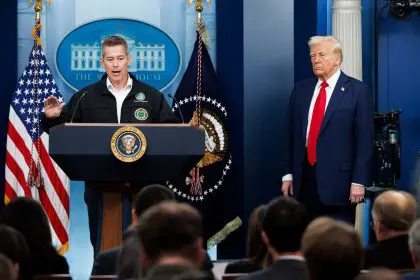That fundamental legal protection allowing detained people to challenge their imprisonment might be on the chopping block. In a development that has alarmed constitutional experts across the political spectrum, Trump administration officials have confirmed they’re “actively looking at” suspending habeas corpus, one of the oldest and most foundational legal rights in American jurisprudence. This extraordinary measure would allow the government to detain individuals without providing justification or allowing them to contest their detention in court.
While framed primarily as a tool to accelerate deportations and circumvent what the administration views as judicial obstruction, the implications extend far beyond immigration policy. Understanding what habeas corpus actually means, the extremely limited circumstances when it’s been suspended throughout American history, and the constitutional questions surrounding who has the authority to suspend it reveals why this development has triggered such significant concern among legal experts regardless of political affiliation.
The ancient right that limits government power
Habeas corpus represents one of the oldest and most fundamental protections against government overreach in the Anglo-American legal tradition. Understanding its origins and purpose helps clarify why potential suspension creates such profound constitutional concerns.
The Latin phrase literally means “you should have the body,” reflecting its core function as a legal order demanding that authorities physically produce a detained person before a judge to justify their imprisonment. This procedural protection prevents people from disappearing into detention without explanation, ensuring the government must provide legal justification for holding someone. This check on arbitrary detention has served as a cornerstone of Western legal systems for centuries, predating even the American Constitution.
The constitutional status of habeas corpus underscores its fundamental importance in American law. The Founders considered this protection so essential that they incorporated it directly into the Constitution rather than adding it later as an amendment. Article I, Section 9 states that “The Privilege of the Writ of Habeas Corpus shall not be suspended, unless when in Cases of Rebellion or Invasion the public Safety may require it.” This placement among the few individual rights in the original Constitution, before the Bill of Rights existed, demonstrates its central importance to the Framers’ vision of limited government power.
The extremely rare historical precedents for suspension highlight its extraordinary nature. Throughout American history, habeas corpus has been suspended only during the most severe national crises, specifically during the Civil War under Abraham Lincoln, during post-Civil War Reconstruction to combat Ku Klux Klan terrorism, in Hawaii following the Japanese attack on Pearl Harbor, and in the American-controlled Philippines during a 1905 insurrection. Each instance occurred during undisputed armed conflict or rebellion with immediate threats to governmental function and public safety.
The scope of protection extends beyond American citizens to anyone detained under U.S. authority, regardless of citizenship status. Supreme Court precedent, particularly in cases involving Guantanamo Bay detentions, has consistently recognized that habeas corpus protection applies to non-citizens as well as citizens. This universal application reflects the principle that checking government detention power protects everyone subject to American jurisdiction, preventing arbitrary imprisonment based on citizenship status alone.
The judicial independence issue lies at the core of habeas corpus function. By design, this protection places detention decisions under judicial review rather than leaving them solely in the hands of police or executive branch officials. This separation of powers ensures that an independent branch of government evaluates detention justifications, preventing unilateral executive imprisonment decisions without oversight. Without habeas corpus, those with arrest and detention authority could potentially imprison individuals indefinitely with no requirement to justify their actions to an independent arbiter.
The current consideration of suspension emerges specifically from administration frustration with judicial checks on immigration enforcement. Multiple federal judges have issued rulings preventing certain deportations or ordering the release of detained individuals, including recently detained students. These judicial interventions represent precisely the independent oversight function habeas corpus was designed to provide, allowing courts to evaluate whether specific detentions comply with existing law rather than simply accepting executive branch assertions.
The immigration enforcement strategy behind the consideration
The administration’s interest in suspending habeas corpus appears directly connected to broader efforts to accelerate deportations while minimizing judicial oversight of immigration enforcement actions. Understanding this context helps explain why this extraordinary measure has entered serious consideration.
Nationwide injunctions issued by federal judges have repeatedly blocked various administration immigration initiatives, creating particular frustration among officials seeking to implement more aggressive enforcement policies. These judicial orders have temporarily halted policies ranging from asylum restrictions to expedited removal procedures. Administration officials, including the president himself, have characterized these injunctions as inappropriate judicial interference with executive authority rather than legitimate constitutional checks on potentially unlawful actions.
The “invasion” justification plays a central role in the legal theory potentially supporting habeas suspension. Since the Constitution only permits suspension during “rebellion or invasion,” administration officials have increasingly characterized unauthorized border crossings as constituting an “invasion” that would potentially trigger this constitutional provision. This interpretation attempts to transform the current immigration situation into one of the extraordinarily rare circumstances where the Constitution contemplates habeas suspension might be permissible.
Multiple judges have already rejected similar “invasion” arguments in related contexts. When the administration invoked the 18th century Alien Enemies Act claiming an “invasion” justification for expedited deportations without normal due process, several federal courts, including judges appointed by Trump, ruled that the current immigration situation does not constitute an “invasion” as legally defined. These rulings specifically noted that the term refers to hostile action by foreign governments or powers, not migration patterns, regardless of their scale or unauthorized nature.
Internal administration discussions have reportedly included exploring ways to classify certain detained individuals as “enemy combatants,” potentially creating another avenue to limit habeas protections. This approach would attempt to place some detainees, particularly those with alleged gang or cartel connections, into a category previously used primarily in military detention contexts. Similar attempts to limit habeas rights for enemy combatants during the War on Terror ultimately faced significant judicial scrutiny, with the Supreme Court repeatedly affirming that some form of habeas protection remains applicable even in national security contexts.
The administration’s broader pattern of seeking to limit judicial review across various policy areas provides important context for these specific habeas considerations. From environmental regulations to immigration enforcement, officials have consistently sought to restrict courts’ ability to review executive actions, often arguing for expanded deference to administrative decisions. The potential habeas suspension represents perhaps the most extreme manifestation of this broader strategy to limit judicial oversight of executive action.
The focus on expediting deportations without court involvement appears to drive much of the interest in habeas suspension. Miller’s public comments explicitly linked the consideration to whether “courts do the right thing or not” regarding immigration cases, suggesting the administration views bypass of judicial review as a potential solution when courts issue unfavorable rulings rather than as an extraordinary measure reserved for true national emergencies as historically understood.
The constitutional questions surrounding suspension authority
The consideration of habeas suspension raises fundamental constitutional questions regarding which branch of government holds suspension authority and under what circumstances such an extraordinary step might be legally permissible.
The constitutional text places the suspension clause within Article I, which primarily addresses congressional powers, strongly suggesting that Congress, not the president, holds the authority to suspend habeas corpus. While the passive construction of the clause doesn’t explicitly state which branch may implement suspension, constitutional scholars across ideological lines, including the late conservative Justice Antonin Scalia, have interpreted this placement as indicating congressional rather than executive authority over suspension decisions.
Historical precedents consistently show congressional involvement in previous suspensions, further supporting the view that presidential unilateral action would be constitutionally questionable. During the Civil War, Congress retroactively authorized Lincoln’s initial suspension. In other historical instances, Congress either directly authorized suspension or passed legislation delegating specific, limited suspension authority during particular crises. No historical precedent exists for a president unilaterally suspending habeas corpus without congressional action.
The extremely limited circumstances permitting suspension under any authority remain strictly defined as “rebellion or invasion” where “public safety may require it.” These terms have historically been interpreted narrowly to mean actual armed conflict or imminent threat to governmental function. Even during the Civil War, when eleven states had seceded and actively fought against the Union, the legitimacy of habeas suspension remained legally controversial, indicating how extraordinary the circumstances must be to justify this measure.
The judicial review question introduces a potential constitutional paradox. If habeas corpus were suspended specifically to prevent courts from reviewing certain detentions, questions immediately arise about whether courts could review the constitutionality of the suspension itself. This creates a circular dilemma where the very judicial oversight being eliminated would normally evaluate whether the elimination itself was lawful. The Supreme Court has never definitively resolved how this paradox would be addressed in a contemporary suspension scenario.
The separation of powers concerns extend beyond technical legal questions to fundamental constitutional structure. Habeas corpus represents a critical check allowing the judicial branch to review executive detention decisions, maintaining the balance between branches that forms the core of American constitutional design. Suspension specifically to prevent judicial review of executive actions would potentially undermine this structural separation, raising concerns about consolidated power that the Constitution was explicitly designed to prevent.
The congressional role becomes particularly important given that the Republican-controlled House of Representatives would likely need to initiate or authorize any constitutionally sound suspension. Without explicit congressional action, a unilateral executive suspension would face immediate legal challenges as an unconstitutional power grab exceeding presidential authority. Even with congressional support, any suspension would still require meeting the extraordinarily high bar of demonstrating genuine “rebellion or invasion” affecting public safety.
The broader implications beyond immigration
While current consideration focuses on immigration enforcement, the potential suspension of habeas corpus carries implications extending far beyond this specific policy area, potentially affecting fundamental constitutional relationships and individual rights.
The precedent-setting nature of any suspension, even if initially limited to immigration contexts, raises concerns about potential expansion to other areas. Historical experience shows that extraordinary powers, once normalized in one domain, often expand to others over time. Initial justifications focusing specifically on immigration enforcement could potentially evolve to include other categories of detainees if the constitutional threshold for suspension were successfully lowered from its traditionally elevated position.
The judicial independence concerns articulated by Chief Justice John Roberts likely reflect awareness of these broader implications. His recent public remarks emphasizing that the judiciary exists to “check the excesses of Congress or the executive” and noting the court’s role in striking down unconstitutional actions came amid reporting about potential habeas suspension. While not directly addressing the specific consideration, these comments underscore the fundamental importance of maintaining judicial review as a check on other branches.
Civil liberties organizations across the political spectrum have expressed alarm precisely because habeas corpus protects against arbitrary detention regardless of the specific policy goals being pursued. Both conservative and progressive legal experts have noted that once established, expanded detention authority without judicial review could potentially be utilized by any administration of any political persuasion, creating concerning precedent regardless of one’s view on current immigration policies.
The international reputation considerations extend beyond domestic legal debates. The United States has historically championed rule of law principles internationally, including the right to challenge detention through independent courts. Suspending this fundamental protection, particularly outside contexts universally recognized as meeting the “rebellion or invasion” threshold, would likely generate significant international criticism and potentially undermine American advocacy for judicial independence and detention rights globally.
The historical context of habeas suspension demonstrates why even temporary or limited suspension creates concern among constitutional scholars. Previous suspensions occurred during undisputed national emergencies like active civil war or following direct attack by foreign military forces. Expanding the definition of circumstances justifying suspension to include challenges manageable through normal legal processes would represent a significant departure from historical understanding of these extraordinary constitutional provisions.
The long-term constitutional implications ultimately transcend immediate policy goals or specific enforcement challenges. Fundamental changes to the relationship between governmental branches and to core individual protections against arbitrary detention would likely outlast any particular administration or policy initiative. This explains why legal experts express concern about potential habeas suspension regardless of their views on the underlying immigration policies the administration seeks to implement.
The likely legal challenges ahead
Any attempt to suspend habeas corpus would inevitably trigger immediate legal challenges raising multiple constitutional questions that would likely reach the Supreme Court through expedited review.
The authority question would form the centerpiece of initial legal challenges, focusing on whether the president can unilaterally suspend habeas corpus without explicit congressional authorization. Constitutional scholars across the political spectrum would likely file amicus briefs arguing that the Constitution places suspension authority with Congress rather than the executive branch. These challenges would cite both the placement of the suspension clause in Article I and the consistent historical pattern of congressional involvement in previous suspensions.
The “invasion” definition would face rigorous judicial scrutiny, with courts evaluating whether unauthorized immigration, regardless of volume, constitutes an “invasion” as understood in constitutional terms. Previous judicial rejections of similar arguments suggest courts would likely apply traditional legal definitions requiring hostile action by foreign governments or powers rather than accepting broader interpretations that would dramatically expand the constitutional provision’s scope beyond its historical understanding.
The geographic scope questions would analyze whether any potential suspension could apply throughout the entire United States or would be limited to specific border regions experiencing the purported “invasion.” Historical suspensions during the Civil War were geographically limited to areas of active conflict rather than nationwide, suggesting courts might require similar limitations even if some form of suspension were deemed constitutionally permissible.
The proportionality requirement would examine whether less extreme measures could reasonably address the identified concerns, as constitutional principles generally require government to use the least restrictive means available when impinging fundamental rights. Challengers would likely argue that existing immigration laws provide adequate enforcement tools without resort to the extraordinary step of suspending core constitutional protections.
The judicial review paradox would inevitably arise, creating the circular question of whether courts can evaluate the constitutionality of a measure specifically designed to prevent judicial review. While the Supreme Court has never definitively resolved this question in the habeas context, historical precedent suggests courts would likely assert authority to determine whether the constitutional prerequisites for suspension exist, even if they might defer to political branches on certain implementation details once those prerequisites were satisfied.
The potential Supreme Court consideration would likely proceed on an expedited basis given the fundamental constitutional questions involved. The Court’s recent jurisprudence regarding executive power, particularly in immigration contexts, suggests the current justices would carefully scrutinize both the authority question and whether genuine “invasion” exists, rather than simply deferring to executive branch assertions on these constitutional matters.
The extraordinary nature of suspending habeas corpus, combined with the specific constitutional limitations surrounding this power, means any attempt would face significant legal obstacles regardless of policy motivations or enforcement goals. The fundamental constitutional questions involved transcend ordinary policy disputes, touching on core separation of powers principles and basic individual protections against arbitrary government detention that have defined American legal tradition since the nation’s founding.

















